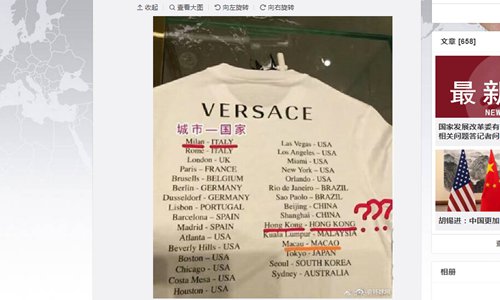HOME >> OPINION
Let the devil not wear Versace in China
By Shan Renping Source:Global Times Published: 2019/8/14 19:23:41

A photo of a Versace T-shirt featuring lists of "city - COUNTRY" on the back, including "Hong Kong - HONG KONG" and "Macau - MACAO." Photo: Screenshot of a post on Sina Weibo
Several foreign brands such as Versace, Coach and Givenchy have been exposed by netizens for identifying China's Hong Kong, Macao, and Taiwan as "countries" on their products and websites. Every such misstep of the foreign haute couture labels has had the internet ablaze. Their brand ambassadors in China said they would immediately sever ties with these labels. And the brands apologized without exception.
There was a round of online criticism against foreign brands listing Hong Kong, Macao, Taiwan as "countries" in 2018, which helped strengthen the awareness of those firms to attach importance to such issues and respect the sentiments of the Chinese public. But as recent incidents have shown, the issue is like a chronic disease.
Some companies and their employees intentionally described Hong Kong, Macao, and Taiwan as "countries," while some may have done it unintentionally by habitually going on with the wrong labeling and failed to make amends in time.
There are several reasons why Chinese netizens are concerned about it and insist that foreign firms should correctly describe Hong Kong, Macao and Taiwan.
First, Hong Kong, Macao and Taiwan are parts of China. This is political common sense around the world. The mistake of thinking otherwise will be erased sooner or later and the sentiment on Chinese internet helps accelerate this progress.
Second, the increasingly rampant Taiwan independence forces have made netizens on the Chinese mainland more sensitive and vigilant. The new round of exposing foreign brands is largely the result of the current situation in Hong Kong. Internet users on the Chinese mainland are expressing their patriotic sentiments by denouncing these foreign companies.
Third, rising political instability have emerged across the globe in recent years. Strained China-US relations have led to strategic transformation of international politics, generating many direct and indirect effects. International corporations will face more challenges. They will encounter higher demand for political correctness when selling their products abroad and will likely face the situation where they have to make trade-offs.
Fourth, staying away from politics should be the lifeblood of small economies like the island of Taiwan. However, Taiwan has dived headfirst into politics and flaunted its "sovereignty," which is equivalent to digging a grave for its economic development. When forced to pick a side, Versace or Coach will not have to think twice before selecting the market on the Chinese mainland, rather than bet their cards on Taiwan.
Given that the market of every country and region is becoming increasingly sensitive to politics, transnational companies should be serious in properly describing Hong Kong, Macao and Taiwan and strive to avoid mistakes in this regard. If something goes wrong, it is important to adopt a proper attitude, make an apology and rectify the mistake in time, not further offend Chinese customers and avoid repeating the mistake Dolce & Gabbana made in 2018. Chinese customers would not reject a brand because of an unintentional mistake when it is corrected in time.
Mutual respect is crucial, especially for Western companies doing business in China. It would not be tough to achieve as long as the companies are sincere.
The author is a commentator with the Global Times. opinion@globaltimes.com.cn
Posted in: VIEWPOINT